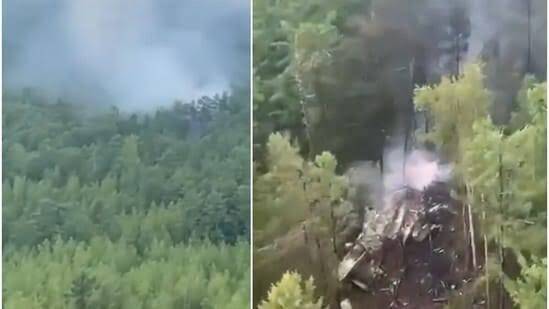A devastating air crash has rocked Russia’s Far East after a passenger plane carrying nearly 50 people plummeted into a mountainous forest near the town of Tynda.
The Antonov-24 plane, operated by Angara Airlines, vanished from radar shortly after attempting a second landing, plunging into thick woodland and erupting into flames.
The twin-propeller aircraft, en route from Blagoveshchensk, lost contact with air traffic control around 1:00 pm local time. A rescue helicopter later spotted its smouldering wreckage 16 kilometres from Tynda, deep within a densely wooded slope. Although teams were quickly mobilised, authorities said there were no immediate signs of survivors.
Adding to the heartbreak, officials confirmed that five children were among the 43 passengers and six crew members on board. While conflicting reports suggest 40 passengers instead of 43, the fear remains unchanged – rescue teams have yet to report any survivors, and hope dims by the hour.
Rugged terrain slows rescue efforts

ALSO READ:
- R. Kelly sentenced to 30 yrs imprisonment for sexual offences
- Osinbajo debunks reports about involvement in Abuja crash
- BREAKING: Liverpool forward Diogo Jota and brother Andre die in car crash
- Helicopter crashes in Lagos state (VIDEO)
Because of the treacherous forest terrain, ground access to the crash site has proven challenging. Nevertheless, the Amur region’s civil defence agency announced that 25 rescue personnel and five emergency vehicles were deployed.
Additionally, four aircraft remain on standby, as the bulk of the operations continue to be conducted from the air.
According to Russia’s Far Eastern Transport Prosecutor’s Office, the ill-fated flight was on its second approach to Tynda Airport before contact was lost. This detail suggests the plane may have encountered landing difficulties, although investigators have not commented on the possible cause of the crash.
Meanwhile, Angara Airlines has remained silent since the incident, offering no public statement. However, scrutiny has intensified due to the age of the aircraft. Reports claim the Antonov-24 involved was nearly five decades old, though it had reportedly received an airworthiness extension in 2021, allowing operation until 2036.
Old Aircraft, new fears for Russian aviation
Despite ongoing efforts to modernise Russia’s aviation fleet, older Soviet-designed planes like the Antonov-24 remain common in remote regions.
Because newer aircraft are often too costly or logistically unsuitable for smaller airstrips, ageing models continue to ferry passengers – sometimes with fatal consequences.
Tags: Tynda, Antonov-24, Angara Airlines, Tynda Airport, plane crash.